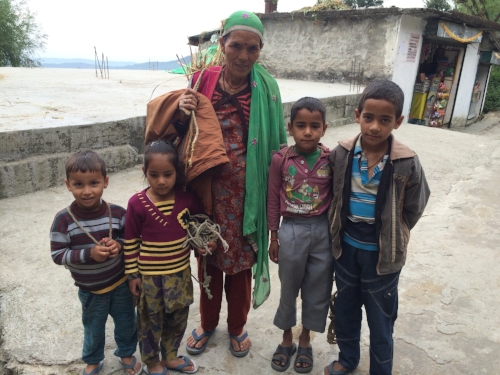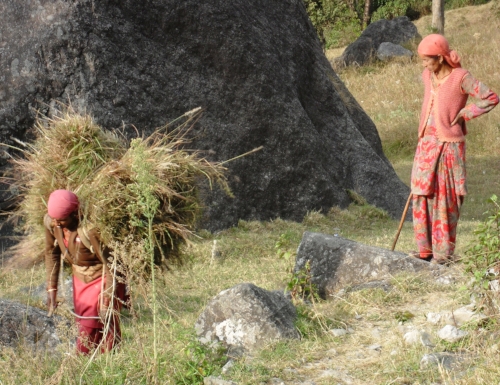Those of you who know me will know I'm a bit crazy about paragliding. So crazy, in fact, that I have been competing in the sport for several years. In 2015, I was fortunate enough to compete in the Paragliding World Cup, taking place in Bir Billing in the Himalayas. However, despite a week of preparation flying for many hours in those beautiful mountains, day after day, to acclimatise to the extreme cold temperatures at altitude, my competition was not to be.
On the first task, I had an accident that would leave me unable to walk properly for several months afterwards. My recovery was fine and all is now well, but at the time I couldn't help but wonder if I had all but wasted the tremendous amount of time, money, emotional and physical effort involved in getting to the world cup. However, amongst the mixture of frustration, sadness and immense thankfulness to still have my life, there was one particular blessing that I would never have experienced were I not grounded.
We were staying in a former cattle shed (now upgraded to have beds, bath tubs and, occasionally, electricity) in a remote village nestled on the side of the mountain from which we flew each day. If the weather was good, the rickety old school bus could get up the track to the village and pick up the children allowed to go. But each day, several children were left behind and went off into the fields next to their huts to gather straw and dung to sell.
With some assistance, I was able to sit on the edge of the fields with some of these families and spend time observing their daily rituals. Although neither of us were able to speak the other's language, we communicated in many ways using body language, hand and face gestures. The main message came through their open, honest eyes and big smiles, that they were a welcoming community who worked hard, enjoyed their environment and cared for each other and their children.
Some of the women gathered fauna and flora which were ground and mixed with the mountain spring water to create dyes, whilst others gathered wool from their animals and prepared it for dying. Some coloured the wools and others set about weaving incredibly beautiful tapestries of cloth with different coloured wools, textures, patterns and motifs. Colours were different according to the season, and the best cloths were kept for selling on the streets and at the market. Despite this, the clothes they wore were of the brightest and most resplendent colours I had ever seen.
Children were equally as entrepreneurial working hard to find things to sell and filling up the bundles and baskets on their heads. When resting, they often sat with me to investigate my medical hardware or play games with the few English words they had picked up from their friends in the village - we had a lot of fun together. The men guarded their mountainside tobacco shacks, waiting for hours for one person to come with whom to trade tobacco for bits of food or equipment, and swapping stories and songs with each other as they waited.
It wasn't until our host, a hard working local craftsman who had taught himself basic English, told us about these communities that my eyes were opened. These were not amongst the lowest caste whose children were only just allowed to go to school, and whose parents would never rise beyond basic poverty. These were the untouchables. People who were not even considered a part of society in general, and who did not have any rights to land, jobs, education or even a recognised identity as a member of the local community.
Yet these were possibly the most authentic, open, welcoming and funny people I had ever met, who had a true affinity with their environment and seemed untouched by the trappings of the western world. They could see my broken body and my pain if I tried to move something I shouldn't, and looked after this complete stranger with curiosity, interest, patience, playfulness and care. Especially their children, who had no fear of me or my splints, sticks and braces.
Only the night before my accident, we as a British team had been discussing which sky gods we needed to watch in the competition, referring to a few of the more exceptionally talented pilots as 'untouchable'. The irony was raw.
I spent a very blessed week in the presence of 'untouchable' people from opposite sides of the world, both of whom made my world a much better place.
Some good friends of mine at the Karma Flights Association made significant strides to support many communities of 'untouchables' during and after the Nepal earthquakes in 2015. As well as recovering many hundreds of children and families from high up in the mountains, where no organised rescue operation could reach, their fundraising has led to building several schools, hundreds of homes and providing basic infrastructure for the many children who were orphaned in the earthquakes, but are unable to claim support from the authorities.
Through the incredible, bold and ground breaking work of Karma Flights and the Cloudbase Foundation, these children will grow up better educated than many, with aspirations for a future they never had before, a resilience born of community empowerment in the face of devastation, and a fire in their belly to become who they were born to be. The Cloudbase Foundation continues to successfully operate a fundraising platform for external projects and organisations who want to facilitate change for good. One of these organisations, Wingate Motion, has made an incredible short film about Nyima, a creative, skilled and strong little girl who is working out what it means to be in the world and yet to be considered untouchable.
This short film is worth watching with your children, asking questions about Nyima, the young girl in the film, and her family, and talking about what it means to them, through their eyes. More details on the project can be found here.
Above all, as we plan for the new term ahead, let's ask ourselves, who are the 'untouchables' in our class or nursery? Who has an identity or security crisis placed on their heads by their circumstances, for whom a secure foundation and a sense of belonging is crucial in order to have a meaningful future? Who do we often find attracting attention, or hiding from attention, and sometimes, very subtly, demonstrating an unmet need through their behaviour? How can we help them belong?
We can't solve the world's problems by ourselves, but we can make significant impacts on the children we are privileged to care for, and they are very much a part of the world picture. Why not renew our commitment to see the world through their eyes, and find out how we can help them more to become who they were born to be?
Ruth Churchill Dower is the Director of Earlyarts, August 2018.





